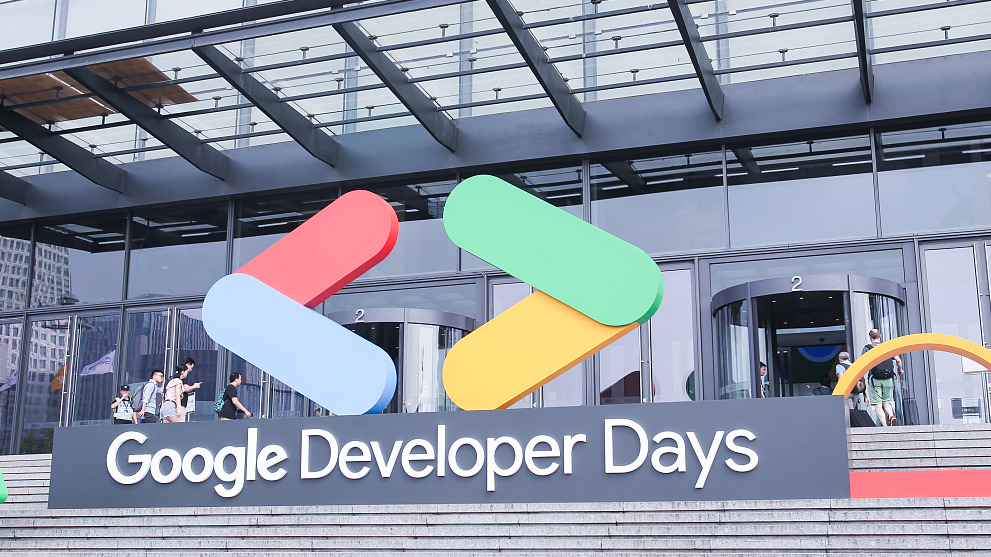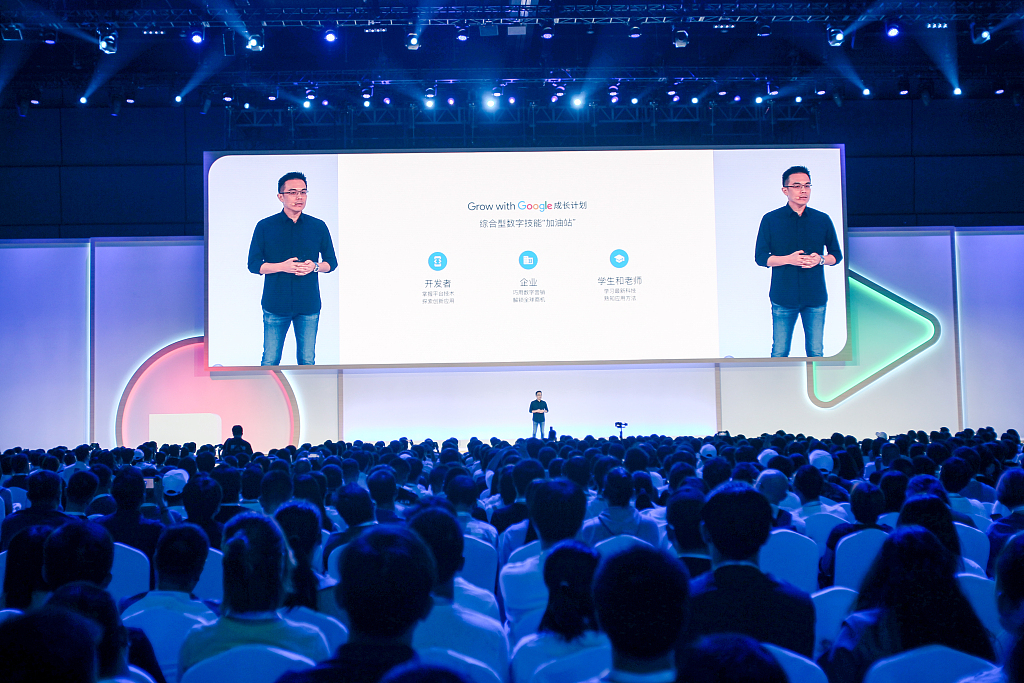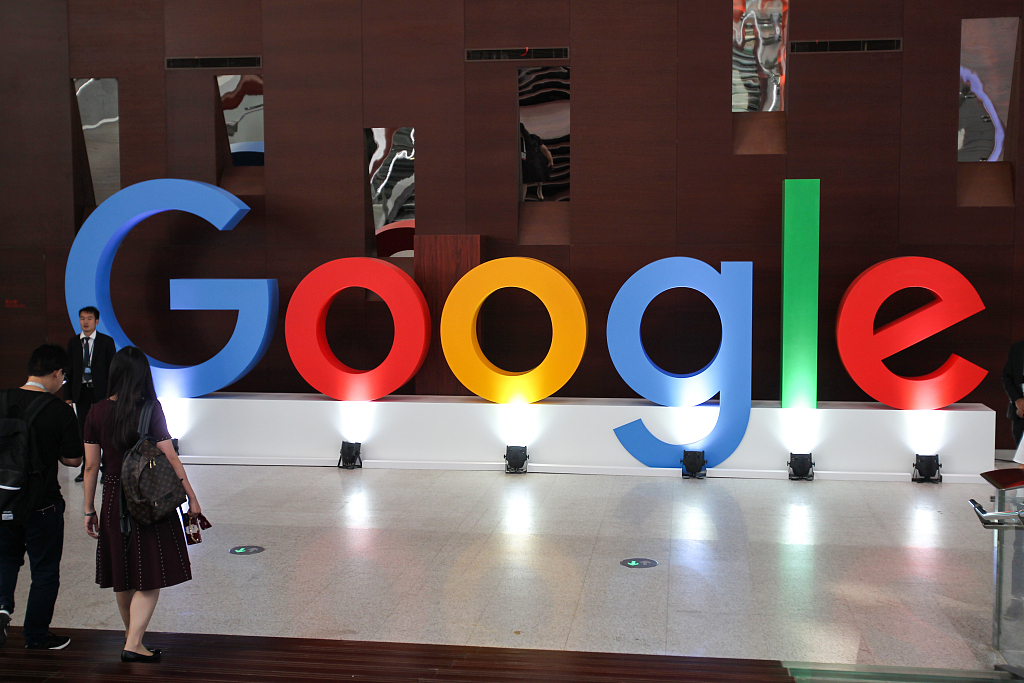

Editor's note: Winston Ma, CFA, was formerly a managing director of the China Investment Corporation (China's sovereign wealth fund), a tech investor and adjunct professor at NYU Law School. He is the author of China's Data Economy (Hayakawa 2019 forthcoming) and China's Mobile Economy (Wiley 2017). He is a Young Global Leader (YGL) and a member of the Digital Economy and Society Council at the World Economic Forum. The article reflects the author's views, and not necessarily those of CGTN.
Google Developer Days (GDD) are Google's annual global events showcasing its latest products and platforms. This week GDD China 2019 is held in Shanghai; as usual, innovations from Google applications like Android, Google Cloud, Google Search and more will be on display.
What's different for GDD this time is the escalated China-U.S. trade friction in the background. The friction between China and the U.S. started in 2018, and both sides ratcheted up bilateral tariffs following the breakdown of trade talks in the summer of 2019. On the tech front, the U.S. government stepped up to place a number of Chinese companies on the "Entity List," blocking them from buying vital American technology and supplies.
That would mean the China market may be forced to introduce new alternatives to operating systems and networking protocols where now there are broadly global standards, which raised the fear that the world may be forced to move toward a bifurcated technology system. As a result, the IT industries of China and the U.S. are taking hits, struggling to come to terms with the new normal of the severed commercial relationships.
In 2019 Chinese companies including Lenovo and Huawei indicated plans to downsize their U.S. operations. On the U.S. side, companies including Oracle, IBM Dell, HP, Apple, Intel, Google and Amazon announced downsizing operations in China. U.S. foreign direct investments (FDI) into China's electronics manufacturing sector also slowed down, reflecting less commitment in expanding manufacturing capabilities and setting up supply chains in China.

A keynote speech delivered by the President of Google China, Chen Junting, in Shanghai during the Google Developer Days opening ceremony, September 10, 2019. /VCG Photo
This new normal is posing serious challenges to the future of innovation. In the new digital economy era, China and the U.S. are forming two leading innovation centers of different strengths. If the two leading innovation centers' technology development are distanced and isolated, that would fragment what has become an increasingly global digital community.
For one thing, the development of technology would become more expensive if the global supply chain is disrupted. For another, local regulations might force companies to develop two different sets of technologies, where China uses Chinese products, and America uses American products, so consumers will have problems with compatibility. Even more seriously, for enterprises, they may see the end of global software solutions that has allowed for cross-Pacific communications and research projects, such as shared development of artificial intelligence technologies.
Still, nothing so far has been as literal and dramatic as a severed data cable that potentially links the two sides of the Pacific. The latest casualty is an 8,000-mile undersea cable connecting Los Angeles to Hong Kong, a joint project among Google, Facebook, and Dr. Peng Telecom & Media Group of China. This high capacity fiber-optic cable is close to completion, but amid the cross-border tension it may be put to a stop.
In the past decade companies like Google and Facebook have made significant investments into similar cables to handle ever-growing network traffic between the U.S. and Asia. However, according to recent media reports, a U.S. multi-agency panel led by the Department of Justice (DOJ), known as Team Telecom, is reportedly objecting to the cable project out of national security considerations.
Because subsea cables form the backbone of the internet by carrying 99 percent of the world's data traffic, if Team Telecom does put a stop to this new cable, its decision essentially would rewrite the rules of internet connectivity between the U.S., China, and the whole world. The cross-border flow of capital, talents, and data, which the global economy has taken for granted, is at risk.

The Google Developer Days in Shanghai, September 10, 2019. /VCG Photo
Therefore, it is encouraging to see cross-border initiatives like GDD that bridges the different innovation hubs of the world, at a time international tensions around AI and tech revolution are on the rise. Dialogue, instead of conflict, is the constructive way to develop the new global "norms" in the cyberspace for a shared digital future.
As the GDD website says, "We're excited to share our thoughts on innovative technologies and encourage developers to build the next mobile app or web experiences today." The digital economy represents a new era, where cross-national and cross-discipline cooperation is inevitable. As U.S. and Chinese entrepreneurs are wrestling with the same tech issues, their cooperation may lead to a promising cross-pollination of tech breakthroughs.
(If you want to contribute and have specific expertise, please contact us at opinions@cgtn.com.)

Copyright © 2018 CGTN. Beijing ICP prepared NO.16065310-3
Copyright © 2018 CGTN. Beijing ICP prepared NO.16065310-3